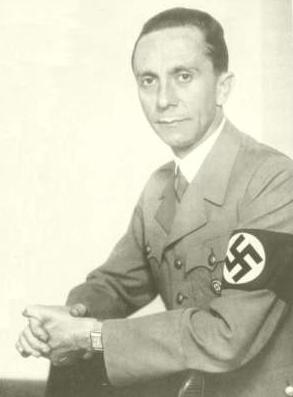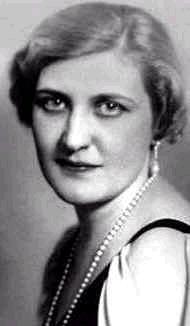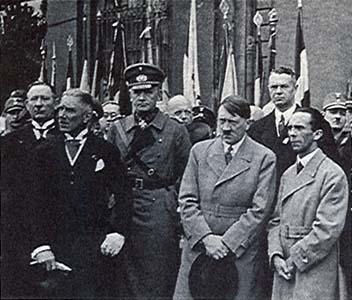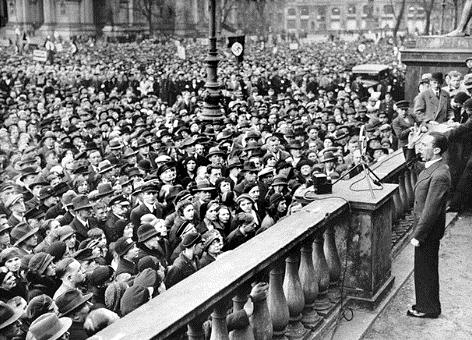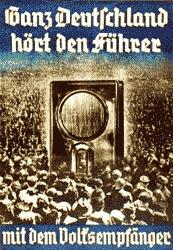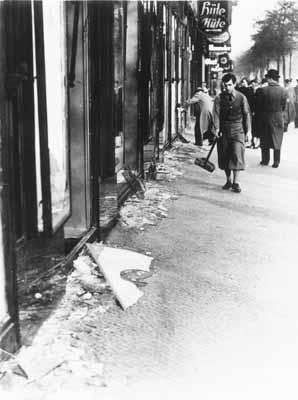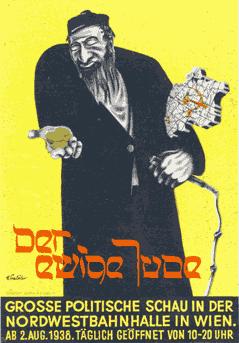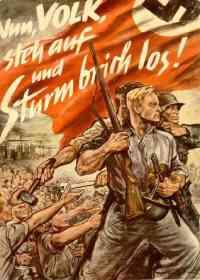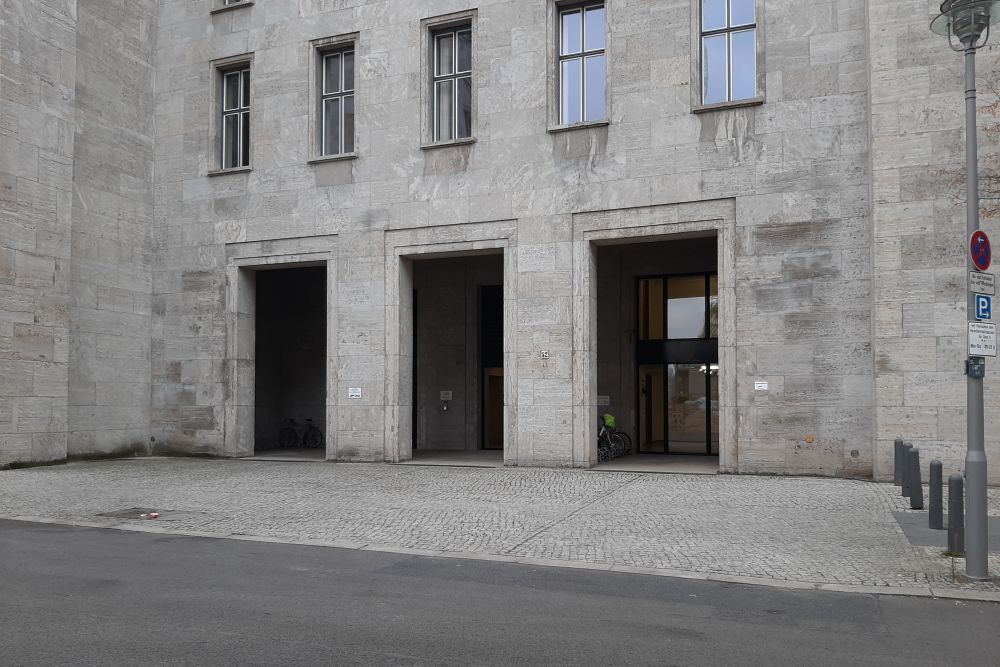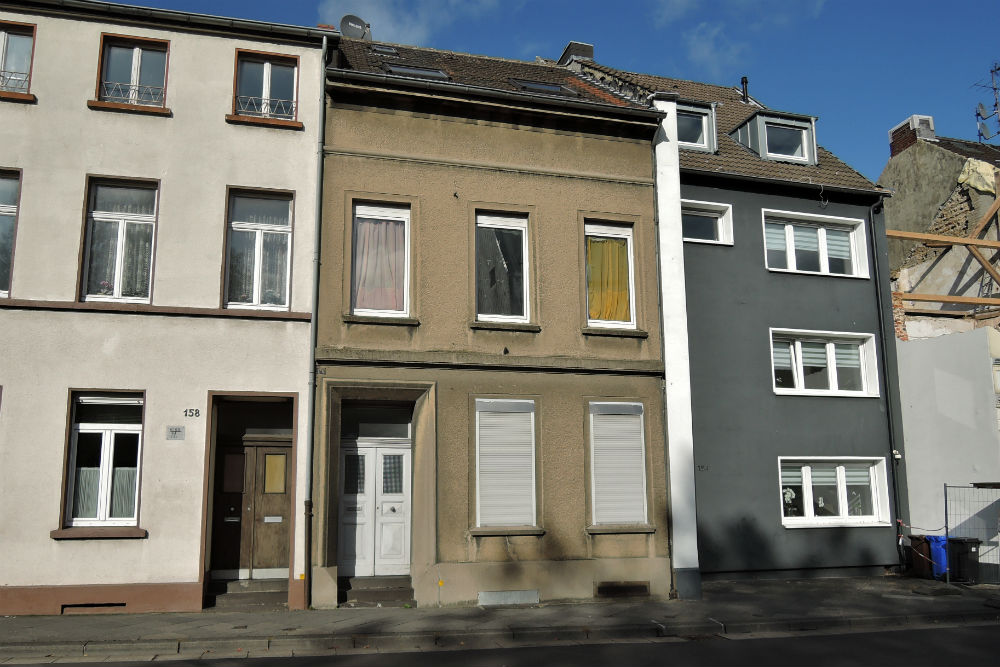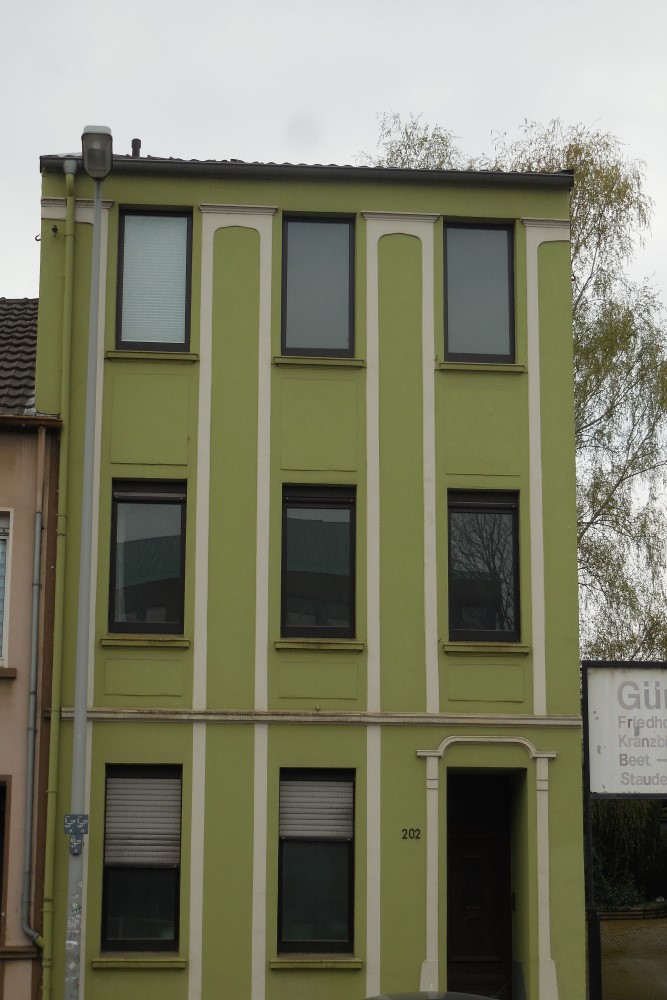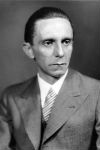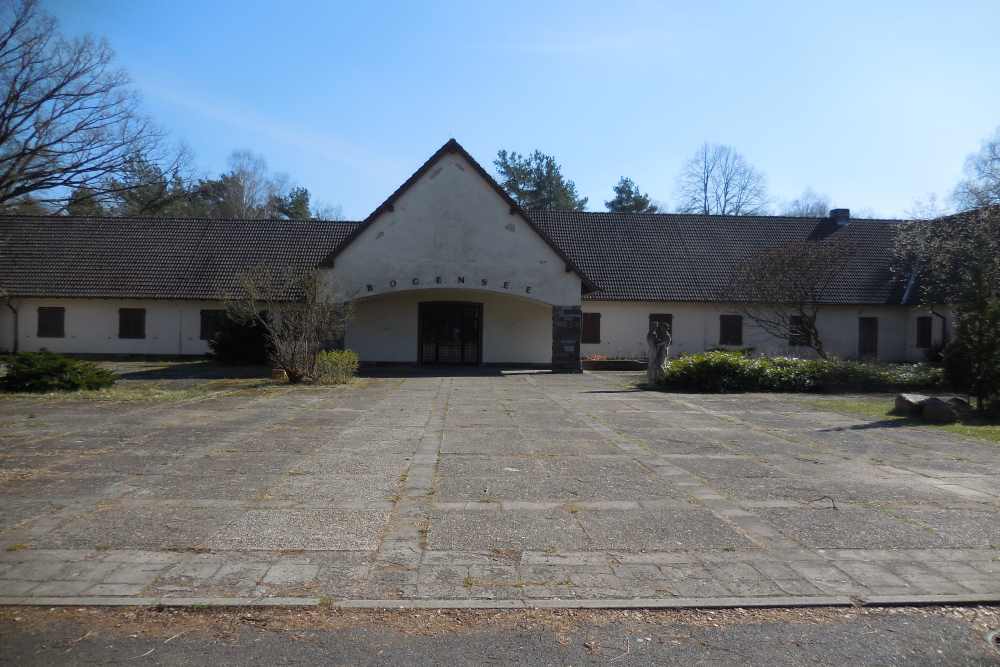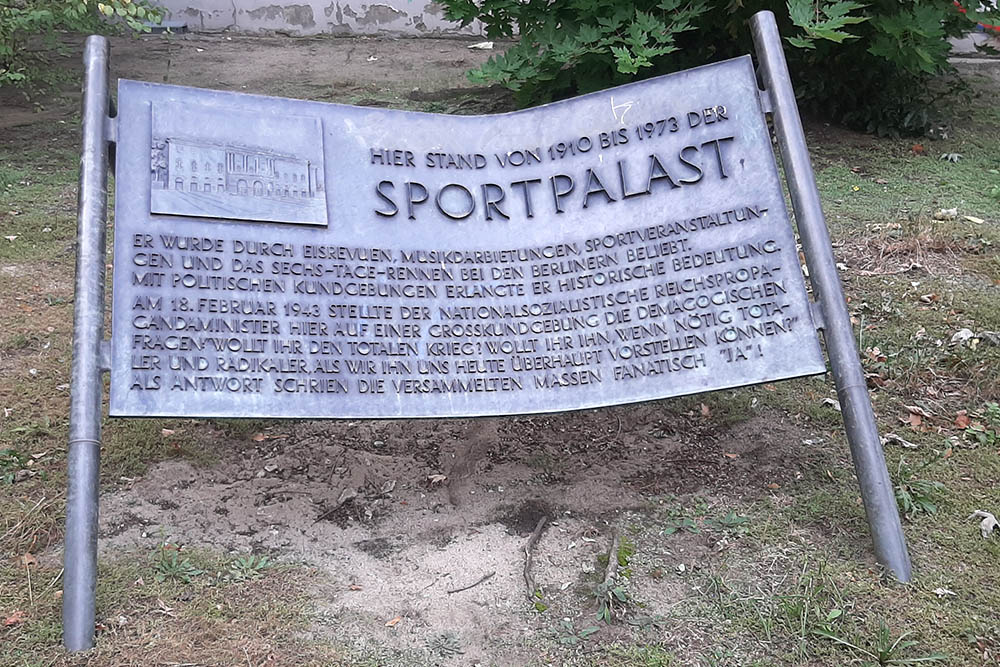Childhood and First World War
Josef Goebbels was born on October 29th, 1897 into a characteristic 19th century Biedermaier familiy (catholic, conservative and lower middle class) near Düsseldorf. The family was not wealthy, his father being the bookkeeper of a small enterprise. On top of that, Josef began to develop health problems. First he contracted polio and later on he suffered from a bone marrow inflammation in his right leg. He overcame it all but his right foot remained underdeveloped. Owing to this handicap and his small stature, Josef was a frequent victim of mockery by his classmates and childrer of his own age.
His body might not function too well; his brains did not desert him however. He was very intelligent. Moreover he made up for his physical handicap by working and studying extremely hard. As a result, young Goebbels graduated from grammar school in Rheydt with excellent marks.
In 1914, World War One broke out. Goebbels, being a good patriot, reported as volunteer but was rejected for military service because of his crippled foot. Therefore he turned to his university studies. Despite quite a few financial problems he earned his degree as doctor of philosophy and Germanistics. This title did not get him a job. After having wandered around for a few years, he ended up in Weimar and made contact with Friedrich Wiegershaus who made him join the Völkische Freiheitspartei (VFP, People’s Freedom Party) to write articles for the Völkische Beobacher (People’s Observer).
He also delivered his first speeches at political meetings. During one of these speeches, he was noted by Gregor Strasser who put him to work in the NSDAP, which had been established again in the meantime, to write the Nationalsozialistische Briefe (National Socialist letters). In the same year, 1925, he met Hitler for the first time. He was not immediately impressed by the Führer. That became obvious in 1926 at a conference in Hannover where he demanded the deportation of "Kleinbürger Adolf Hitler" (blockhead). After a short time, his political opportunism caused him to chose Hitler’s side anyway.
Definitielijst
- Führer
- German word for leader. During his reign of power Adolf Hitler was Führer of Nazi Germany.
Images
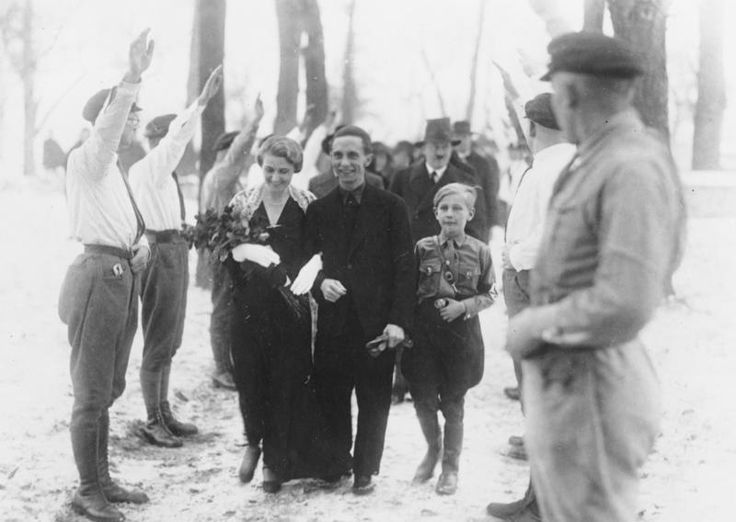 Wedding day, December 19th, 1931. Josef and Magda on their way to church. Source: Bundesarchiv.
Wedding day, December 19th, 1931. Josef and Magda on their way to church. Source: Bundesarchiv.A new political star
From that moment on, Goebbels’ career soared. He became the leader of the important Gau (region) Brandenburg. Here the Nazis were to make a breakthrough in order to play a vital role in the political arena. He launched his own political daily paper Der Angriff (The Attack). He designed posters himself and made propaganda which continuously caused mayhem. His paper included, above all, a veritable hate campaign against Jews in general and against the Berlin chief of police, Weiss (a Jew) in particular.
Josef Goebbels met Hitler again on various occasions and after the elections of May 20th, 1928, he won a seat in the Reichstag (German parliament). He really would have nothing at all of this democratic instrument but he knew only too well participation in the existing political system was the only way to make a breakthrough. Dr. Goebbels did not hide his aversion for the Reichstag at all and he stated publicly that elected members of the NSDAP only became members of the Reichstag because: "the Weimar ideology itself would help them to destroy it"
.Goebbels gradually appeared more often in public with numerous speeches at political meetings. Hitler soon discovered his acute intellignece, his unmistakeable talent as an orator with the necessary feeling for the theatrical and, not unimportant, his ideological radicalism. He appointed Goebbels chief of party propaganda. This put Goebbels in charge of no less than 120 daily and weekly papers with more than a million readers nationwide. The new chief of propaganda also gained increasing success with his inspiring and imaginative performances. He achieved a breakthrough for the NSDAP in the Gau Berlin.
Meanwhile, the political orator also found happiness in love. He met Magda Quandt at headquarters of the Gau Berlin. They were married soon on December 19th, 1931. Magda, who already had a son from a previous marriage, would bear Goebbels six children: Helga, Hildegard, Helmut, Hedwig, Holdine and Heidrun - the initial H was a conscious choice as token of their admiration for Hitler. They were blue-eyed and blond-haired, making them the ideal Übermensche (superhumans) and consequently perfect models for propaganda. Despite this domestic happiness, Goebbels, a true womanizer, could be found very regularly in the company of the Czech moviestar Lida Baarova. Hitler took great pains persuading Magda not to divorce because this would create an huge scandal and the NSDAP could very well do without that.
Hitler owed his growing success by no small means to Goebbels and his cunning and well thought of propaganda techniques. The entire hype, the myth that was created around Hitler in the thirties were all of his making. Hitler was shoved into the spotlights as the new Messiah, the Führer who would save the Germans, who had suffered so many setbacks, from the Jews, the Marxists and the anti-socials who were to blame for all of their problems. Goebbels managed to portray Hitler as the Savior of the Fatherland. He gave Hitler an aura of infallability, an image the Germans fell for in droves.
Von Hindenburg named Hitler Reichskanzler (Statechancellor). Henceforth, the NSDAP pulled all the strings in Germany. On the heels of the success of the NSDAP and Hitler, Goebbels climbed higher and higher in the Nazi hierarchy. In turn, Hitler promoted his loyal orator to Reichsminister für Volksaufklärung und Propaganda (Stateminister for Information and Propaganda). Not by any coincidence, shortly after the seizure of power by the NSDAP, the Reichstag building went up in flames on February 27th, 1933.
Definitielijst
- Führer
- German word for leader. During his reign of power Adolf Hitler was Führer of Nazi Germany.
- Gau
- “Shire”. District in the Third Reich established by the NSDAP.
- ideology
- A collection of principles and ideas of a certain system.
- Jews
- Middle Eastern people with own religion that lived in Palestine. They distinguished themselves by their strong monotheism and the strict observance of the Law and tradition. During World War 2 the Jewish people were ruthlessly persecuted and annihilated by the German Nazis. . An estimated 6,000,000 Jews were exterminated.
- Nazi
- Abbreviation of a national socialist.
- NSDAP
- Nazi Party, byname of National Socialist German Workers' Party, German Nationalsozialistische Deutsche Arbeiterpartei (NSDAP), political party of the mass movement known as National Socialism. Under the leadership of Adolf Hitler , the party came to power in Germany in 1933 and governed by totalitarian methods until 1945.
- propaganda
- Often misleading information used to gain support among supporters or to gain support. Often used to accomplish ideas and political goals.
- Reichstag building
- German government building in Berlin.
Images
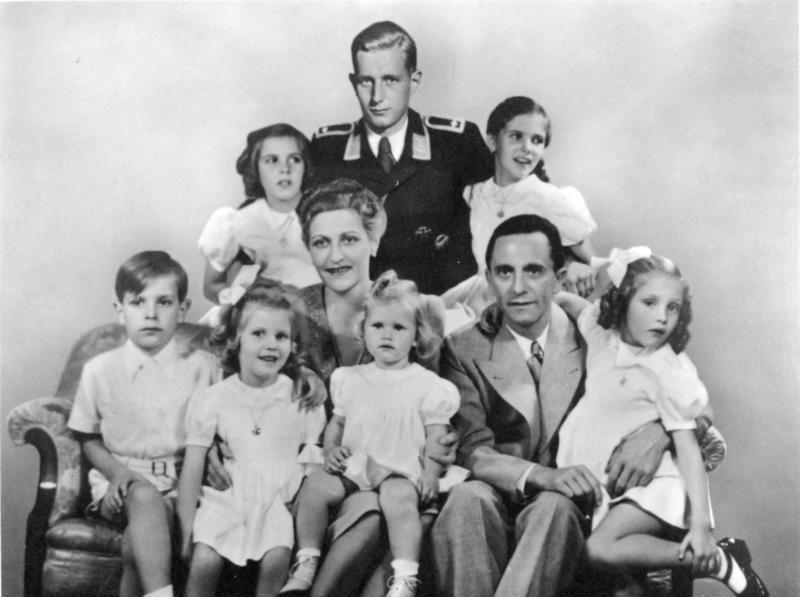 Family portrait: In the center Magda and Joseph Goebbels and their six children Helga, Hildegard, Helmut, Hedwig, Holdine and Heidrun. Behind them Harald Quandt wearing the uniform of a Luftwaffe sergeant. Source: Bundesarchiv.
Family portrait: In the center Magda and Joseph Goebbels and their six children Helga, Hildegard, Helmut, Hedwig, Holdine and Heidrun. Behind them Harald Quandt wearing the uniform of a Luftwaffe sergeant. Source: Bundesarchiv.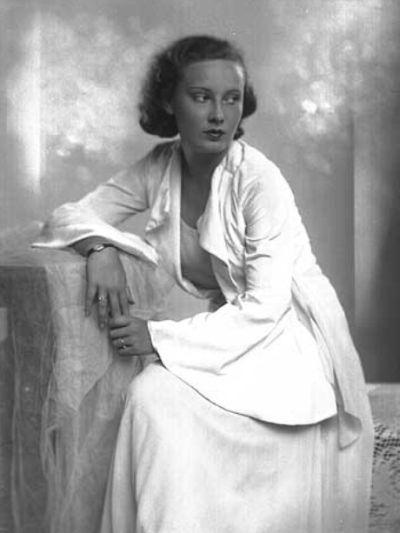 Czech actress Lida Baarova. Source: Wikimedia Commons.
Czech actress Lida Baarova. Source: Wikimedia Commons.Stateminister for Information and Propaganda and Nazi ideology
The National socialist ideology desired a total cultural reform of German politics and society whereby the community (at least in theory, but in reality the State) controled every aspect of the life of the individual. The slogan "Ein Volk, ein Reich, ein Führer" (One People, one State, one Führer) is based on this priciple. The Nazis wanted, as it seemed, to create one community within a large empire under the direction of one man, Hitler. The goal of National Socialism was to penetrate the life of each individual by creating an organic society in which each and everyone and each organization would be co-ordinated and controled by the party, as the party was the protector of the Volksgemeinschaft (People’s society).
The regime found many ways to propagate its thesises: through schools and universities, through all sorts of activities such as the yearly partyrally in Nuremberg and through organizations such as the HitlerJugend (HJ, Hitler Youth) and the Bund Deutscher Mädel (BdM, Association of German Girls).
With a number of new public holidays, the attention of the Germans was to be focused on the community and hence their participation in the Volksgemeinschaft was strengthened. These festivities were accompanied by parades and mass meetings. As it was, Hitler believed that such meetings enabled the people to step out of their own closed communities and participate in the larger society.
National socialism was a militant movement aimed at the destruction of all modern, industrial, urban, unpersonal and fragmented communities and replace them with an Arian community in which all men and women knew their places, could give meaning to their lives in their devotion to the Volksgemeinschaft and return to harmony amongst themselves, between nature and the community. National socialism only partially succeeded to turn the ideology of the Volksgemeinschaft into reality. The Nazis really did succeed in the exclusion of Jews from public life only. Historians have not yet determined however whether this systematic policy of exclusion in the thirties meant a conscious prelude to the Endlösung (final solution).
Goebbels and his propaganda machine played a very important role in this Gleichschaltung (co-ordination) of German society. In his function as minister he exercised full power over the media (press, radio, advertising, movies etc.). This gave him the opportunity to bring journalists and all of their publications under statecontrol. All journalists, writers and other artisans were obliged to register with one of the ministerial departments. In this way, he kept everybody under control and he managed to exclude Jews and political opponents from any public platform and so prevented them from influencing the German public. Goebbels also initiated the cleansing of the world of art. His famous Feuerrede (fire speech) of May 10th, 1933 resulted in publicly burning thousands of books by Jewish, Marxist and other subversive (read: critical) authors.
Definitielijst
- Endlösung
- Euphemistic term for the final solution the Nazis had in store for the “Jewish problem”. Eventually the Endlösung would get the form of annihilating the entire Jewish people in extermination camps.
- Führer
- German word for leader. During his reign of power Adolf Hitler was Führer of Nazi Germany.
- Gleichschaltung
- “Standardisation”, “equalisation”. Aim of the NSDAP to model all social and cultural organisations to the national socialist ideal. Nobility and other traditional structures were targeted, as were other pluralist phenomena.
- ideology
- A collection of principles and ideas of a certain system.
- Jews
- Middle Eastern people with own religion that lived in Palestine. They distinguished themselves by their strong monotheism and the strict observance of the Law and tradition. During World War 2 the Jewish people were ruthlessly persecuted and annihilated by the German Nazis. . An estimated 6,000,000 Jews were exterminated.
- National Socialism
- A political ideology drawn up by Hitler based on the superiority of the German race, the leader principle and fierce nationalism that was fed by the hard Peace of Versailles. National socialism was anti-democratic and racist. The doctrine was elaborated in Mein Kampf and organised in the NSDAP. From 1933 to 1945 National socialism was the basis of totalitarian Germany.
- propaganda
- Often misleading information used to gain support among supporters or to gain support. Often used to accomplish ideas and political goals.
- Socialism
- Political ideology aiming at slight or no class differences. Means of production are owned by the state. Evolved as a response to capitalism. Karl Marx tried to substantiate socialism scientific.
Images
Conductor of the propaganda orchestra
Goebbels was not by any coincidence the master of propaganda. He prepared each speech for hours, each intonation, each movement, each word was painstakingly rehearsed. He maintained the same consideration by working out party propaganda in general. Doctor Goebbels, as he preferred to be called, had worked out style and technique for the public perfomances of the party. The mass manifestations, the processions with banners, the partydays, all those were his brainchild.
He maintained a few important principles in which the truth certainly did not play a central part. Only credibility determined whether propaganda was expedient or not. Content was edited in such a way that it was favourable to the correct (read: German) side. Care was taken that subjects were simple and easy to understand. In Nazi Germany The truth was non-existant; Goebbels made the truth. The sole big, absolute truth was that the Führer and the party were always right.
In order to reach the Germans and make them more susceptible to propaganda, the Nazis started marketing radios in their thousands. Up to then, the written press (newspapers, pamphlets and such) were the instruments of choice of propaganda. Under Goebbels, this course would be altered drastically. The Reichsminister said about this: "Revolutionary movements will not be created by great authors but by great orators. It is misleading to think that the written word is more effective as newspapers will be read by a large number of people. An effective speech is far more suggestive than a good editorial."
From August 1933 onwards, the Volksempfänger (People’s receiver) VE 301 was massively offered for sale at a reasonable price of approximately 76 Reichsmark. These bakelite radios usually had three tubes. Later in 1938, espcially developed radiotubes for the DKE 38 Goebbels’ Schnauze (Goebbels beak) were used so that two tubes were sufficient and production would become cheaper still. Ultimately, the price of the radio dropped to 35 Mark. The type number 301 referred to the seizure of power by the Nazis on 30-1-1933.
The radio was such a success that manufacturers could not keep up with demand. As not each family could obtain a radio, collective listening was encouraged. In factories, work was sometimes suspended for hours to listen to speeches by Hitler or Goebbels. Public places like restaurants and bars were obliged to have a radio. There were even officials whose task consisted of stimulating people to listen to the Nazi programmes. In this way the radio, as proclaimed by Goebbels as the eighth power, became the instrument of choice to continuously overwhelm the man in the street with the Nazi ideology. The slogan was: Ganz Deutschland hört den Führer mit dem Volksempfänger (All of Germany listens to the Führer with the people’s receiver).
Definitielijst
- Führer
- German word for leader. During his reign of power Adolf Hitler was Führer of Nazi Germany.
- ideology
- A collection of principles and ideas of a certain system.
- Nazi
- Abbreviation of a national socialist.
- propaganda
- Often misleading information used to gain support among supporters or to gain support. Often used to accomplish ideas and political goals.
Images
Anti-Semitism and Kristallnacht
The Jews were the target of Goebbels’ propagandamachine. They were continuously demonitized and portrayed in caricatures, aimed to show how ugly and evil they really were. In his first propagandacampaigns however, he never went about bluntly. His campaigns were like a sneaking poison slowly infecting the minds of the Germans and making them averse to Jewry. It is therefore conspicuous that only a very few Jews left Germany. This was largely the result of Goebbels’ subtle approach. His strategy consisted of misleading the Jews, so that not many realized the dangers that were waiting for them. When they did see the danger, it was already too late for them to leave Germany.
In the course of the thirties, anti-Semitism increasingly gained the upper hand in the campaigns. That evolution culminated in the Kristallnacht of November 9th and 10th, 1938. It was the first massive and orchestrated pogrom in Nazi Germany. The immediate cause was the shooting of a German diplomat by the 17 year old Jew Hirschel Grynszpan. He had just been informed that his family had been expelled from their home and would be taken to the Polish border. The young man, who lived in France with his uncle, went to the German embassy in Paris to assassinate the German ambassador. When he discovered he was not present, he shot the German third attaché, Ernst von Rath. This was the ideal excuse for Goebbels to organize a massive pogrom. He had the press publish articles that were edited in such a way, they just had to incite agression. It was presented as an international Jewish conspiracy aimed at the Third Reich and, symbolically against the Führer. Goebbels also sent the Sturmabteilung (SA, stormtroop) out into the streets to stir up the crowds even more.
In the night of November 9th and 10th Jews and their possessions were attacked all over Germany and also in Austria and the Sudetenland. Hundreds of synagogues were set on fire, Jews were beaten up, shops plundered and graveyards violated. About a hundred Jews lost their lives while a few hundred were injured. About 30.000 Jews were arrested and sent to concentrationcamps and their possessions confiscated.
On November 10th, Goebbels called a press conference to explain the "spontaneous eruptions of people’s anger". He vehemently denied rumours about plundering and mal-treatment. There was little or no international protest. Kristallnacht was an important step in the attitude of the Nazis towards Jews. Up till then, violence against Jews had been tolerated but Kristallnacht was the first step towards systematic violence (organized by the Nazi authorities).
New propaganda measures were issued and Goebbels ordered theater- and stagecompanies to include anti-Semite themes with special attention to the "conspiracy by international Jewry". These measures were probably taken because that kind of violence against Jews was still a step too far for many Germans. In order to ripen the population for a harsh and violent anti-Jewish policy, Goebbels started a propagandacampaign, aimed to show the real face of the Jews, the arch enemies of the Third Reich. In the past, Jews had already been ridiculed and humiliated frequently. These campaigns were henceforth intensified.
Definitielijst
- Führer
- German word for leader. During his reign of power Adolf Hitler was Führer of Nazi Germany.
- Jews
- Middle Eastern people with own religion that lived in Palestine. They distinguished themselves by their strong monotheism and the strict observance of the Law and tradition. During World War 2 the Jewish people were ruthlessly persecuted and annihilated by the German Nazis. . An estimated 6,000,000 Jews were exterminated.
- Kristallnacht
- The night of 9-10 November 1938. Over 250 German synagogues were destroyed. Tens of thousands of Jews were arrested.
- Nazi
- Abbreviation of a national socialist.
- propaganda
- Often misleading information used to gain support among supporters or to gain support. Often used to accomplish ideas and political goals.
- strategy
- Art of warfare, the way in which war should be conducted in general.
- Sturmabteilung
- Storm detachment. Semi-military section of the NSDAP. Founded in 1922 to secure meetings and leaders of the NSDAP. Their increasing power was stopped during “The night of the long knives”, 29 and 30 June 1934.
Images
The eternal Jew
Movies that made caricatures out of Jews and humiliated them regularly were important elements of the anti-Jew campaign. To this end, " Die Rothschilds" and "Der Jude Süss" were released in 1939. The ‘masterpiece’ of the anti-Semitic propaganda movies, "Der ewige Jude" (The eternal Jew) was released in 1940. The movie aimed at propagating the National Socialistic attitude towards Jews to the general public and was therefore presented as a documentary, showing the Jew as he really was. A major part of the movie was shot in the ghetto at Lodz in Poland. Director Fritz Hippler denied the documentary had been staged. Naturally, the opposite was true. The staging often is glaringly obvious: the ‘actors’, Jews who were just plucked from the streets, behave very uneasy. The presence of the camera undoubtedly influenced their behaviour.
The eternal Jew was intended to expose those Jews who had adapted themselves to the western life style. "But therein lurks the danger. They may have adapted themselves outwardly but inwardly they still are just as evil and uncivilized. Their adaptation is only false pretence. In this manner they will make us realx our vigilance and at the moment we no longer expect it, they will seize power". Of course, the Nazis had seen through this cunning. In order to make the population aware of the so called Jewish danger, the ‘real Jewish face’ was shown. In horrible and frightening scenes accompanied by hateful comments the Jews were dehumanized. That was the focal point of the movie: to show the Germans Jews really were inhuman. Such Untermensche (subhumans) were not to be treated humanely. Not the Nazis were evil and inhumane for wanting to put the Jews in concentrationcamps; on the contrary, the Jews were evil and inhumane so the Nazis were more or less obliged to house them in concentrationcamps. This notion made it possible that Jews were discriminated against in such a large measure and ultimately murdered.
On August 30th, 1940 Hitler gave the movie the green light. In November, the censors passed Der ewige Jude for public viewing and it premiered in Berlin on November 28th. The audience, consisting of quite a few representatives of the Wehrmacht, NSDAP, science and arts received the movie with a loud applause. Goebbels was convinced the movie would attract huge crowds but that was a disappointment. The harsh, often shocking scenes frightened many people away. The movie was shown regularly in circles of SS and Wehrmacht only.
Definitielijst
- ghetto
- Part of a town separated from the outside world to segregate Jewish population. The establishment of ghettos was intended to exclude the Jews from daily life and from the rest of the people. From these ghettos it was also easier to deport the Jews to the concentration and extermination camps. Also known as “Judenviertel” or Jewish quarter.
- Jews
- Middle Eastern people with own religion that lived in Palestine. They distinguished themselves by their strong monotheism and the strict observance of the Law and tradition. During World War 2 the Jewish people were ruthlessly persecuted and annihilated by the German Nazis. . An estimated 6,000,000 Jews were exterminated.
- propaganda
- Often misleading information used to gain support among supporters or to gain support. Often used to accomplish ideas and political goals.
- Wehrmacht
- German armed military forces, divided in ground forces, air force and navy.
Images
The Second World War
On the outbreak of World War Two, Goebbels strengthened Nazi propaganda even further. It was imperative to keep the population aware of developments at the front. This was done mainly by Sondermeldungen (news flashes) on the radio that gave the impression they came live from the front. There also was the Wochenschau (weekly news reel), which steadily increased in duration and showed images of the glorious German troops. The first years progressed very favourably indeed for the Wehrmacht. It enjoyed great successes on all fronts.
In 1941 Goebbels showed yet another extraordinary example of how he could manipulate the press. Rumours to the effect that Germany was preparing for an attack on the Soviet Union grew increasingly stronger. The Nazi leaders undoubtedly wanted to prevent Stalin from being warned of this and take precautionary measures accordingly. In order to suppress these rumours, Goebbels wrote an article for the Völkische Beobachter entitled "The Cretian example". In the article he stated that the capture of Crete was some sort of dress rehearsel for a large scale landing by paratroops. The object of such a landing could only be Great-Britain. With this article it seemed Goebbels had spoken out of turn announcing the invasion of England. This impression was even strengthened when the police set about confiscating all copies of the paper a few hours after its publication. This way, Goebbels managed to suppress all rumours of an imminent attack on the Soviet Union, winning valuable time. Attention turned to the western front (at least temporarily) where the attack on the British Isles was expected. On June 22nd, 1941, Operation Barbarossa, the invasion of the Soviet Union was launched.
In December 1942, Goebbels escaped an attempt on his life. The Minister of Propaganda owned a house on the island of Schwanenwerder. The engineer Hans-Heinrich Kummerow attempted to blow the bridge the moment Goebbels crossed it. While he was placing the charges under the bridge, he was caught in the act and arrested. Kummerow was sentenced to death on December 16th, 1942. Henceforth, Goebbels was continuously guarded by the Sicherheitsdienst (SD security police). Moreover, Hitler gave him an armoured Mercedes as a Christmas present.
At the end of 1942 and the beginning of 1943, the battle for Stalingrad was definitely settled in disfavour of the Germans. This marked the beginning of the end of the Third Reich. Goebbels had to attempt and explain this humiliating defeat to the German population in such a way that they would not lose their faith in a favourable end to the war. On the other hand, the population had to realize as well that stronger efforts were needed to guarantee this favourable end. Early 1943, the Allies demanded unconditional surrender by the Axis powers. Goebbels would turn this to his advantage.
In one of his best known and best remembered speeches, Nun, Volk, steh auf und Sturm brich los! (Now people, rise up and storm, spring up) at the Berlin Sportpalast (sports palace) on February 18th, 1943, Goebbels declared total war: " Ich frage Euch: Wollt Ihr den totalen Krieg? Wollt Ihr ihn, wenn nötig, totaler und radikaler, als wir ihn uns heute überhaupt noch vorstellen können? (I ask you: Do you want total war? Do you want it, if necessary more total and more radical than we can ever imagine today?)
Fünftens: Die Engländer behaupten das deutsche Volk hat sein Vertrauen zum Führer verloren. Ich frage Euch: Ist Euer Vertrauen zum Führer heute größer, gläubiger und unerschütterlicher denn je? (Fifth: the English claim the German people has lost its faith in the Führer. I ask you: Is your faith in the Führer stronger today, more dedicated and more unshakable than ever before?) Ist Eure Bereitschaft, ihm auf allen seinen Wegen zu folgen und alles zu tun, was nötig ist, um den Krieg zum siegreichen Ende zu führen, eine absolute und uneingeschränkte? (Is your willingness to follow him in all his ways absolute and unlimited and are you willing to do all that is necessary to continue the war to its glorious conclusion? " The spectators in their thousands were highly enthousiastic and chanted; "Führer befelht, wir folgen (Führer command, we follow).
Goebbels’ genius as an orator and his sense of grandiloquence had won the day again. At the same time Goebbels wanted to exert more pressure on Hitler with his speech to effectively take measures for total war. The Reichsminister did not like it at all that he was not involved in the organization of total war. He was driven up the wall by the half-hearted measures. Goebbels wanted to go much further: he demanded compulsory labour for women, the closing of all luxury shops and enterprises, including the large markets and luxurious hotels.
The ambitious Goebbels was no longer satisfied with his work as Minister of Propaganda. He thought he was only good enough to think up nice words for someone else to use. Of course, he exerted power over the media but he had to share it with the Reichspressechef and the military supreme command. In order to win more attention from the public, he began to write a weekly editorial for Das Reich (newspaper The State). By frequently appearing in public he hoped to gain more power and influence, without much success for the time being. During the years of war, Goebbels was no longer the man with the great power and influence in Nazi Germany, despite his function and his talent as an orator. His years of glory seemed to be over.
The tide turned following the attempted assassination of Hitler on July 20th, 1944. That day, Von Stauffenberg placed a timebomb, hidden in a briefcase, beneath the table in the conference room where Hitler and his generals were having a meeting. The bomb went off but Adolf Hitler survived the attempt. Owing to his quick thinking and determined conduct, Goebbels managed to isolate the major conspirators and had them arrested the same day. Later, Goebbels was appointed by Hitler to take charge of a special commission to investigate the case further.
This situation provided Goebbels with quite a number of possibilities. He urged Hitler to grant him the necessary political and military powers of attorney. This finally was Goebbels’ chance to take charge of total war. In an attempt to persuade Hitler of the necessity of this, he promised he could put a million fresh soldiers in the field within three months. Still in July, 1944, Goebbels was rewarded for his efforts: Hitler appointed him Generalbevollmächtigter für den totalen Kriegseinsatz an der Heimatfront (Plenipotentiary-general for the total war effort on the homefront). As his personal contribution to total war, Goebbels reduced his own official and personal staff.
He fired a number of officials, secretaries, cooks and maids so they could go to work in the armament industry. In reality however it turned out they went to work for other departments of the government. Despite Goebbels’ orders and decrees, a huge waste of manpower existed within the government offices. The measures, often half-hearted or sometimes even contradictory did not by far have the desired effect. German was on the brink of collapse and these measures often led to more confusion and chaos.
December 1944 saw the last convulsion of the dying Third Reich. The Ardennes offensive was the last major attack of the Wehrmacht. This offensive caused Hitler to pamper Goebbels: his measures for total war would have enabled the establishment of the Volksgrenadierdivisionen (People’s Grenadeer Divisions) who were deployed at the forefront of the offensive. The ambitious Goebbels, finally in the spotlights for real, gladly accepted the praise. After a few weeks the offensive was brought to a standstill and the German troops were thrown back.
Definitielijst
- Ardennes offensive
- Battle of the Bulge, “Von Rundstedt offensive“ or “die Wacht am Rhein“. Final large German offensive in the west from December 1944 through January 1945.
- Führer
- German word for leader. During his reign of power Adolf Hitler was Führer of Nazi Germany.
- invasion
- Armed incursion.
- Nazi
- Abbreviation of a national socialist.
- offensive
- Attack on a smaller or larger scale.
- propaganda
- Often misleading information used to gain support among supporters or to gain support. Often used to accomplish ideas and political goals.
- Soviet Union
- Soviet Russia, alternative name for the USSR.
- Wehrmacht
- German armed military forces, divided in ground forces, air force and navy.
Images
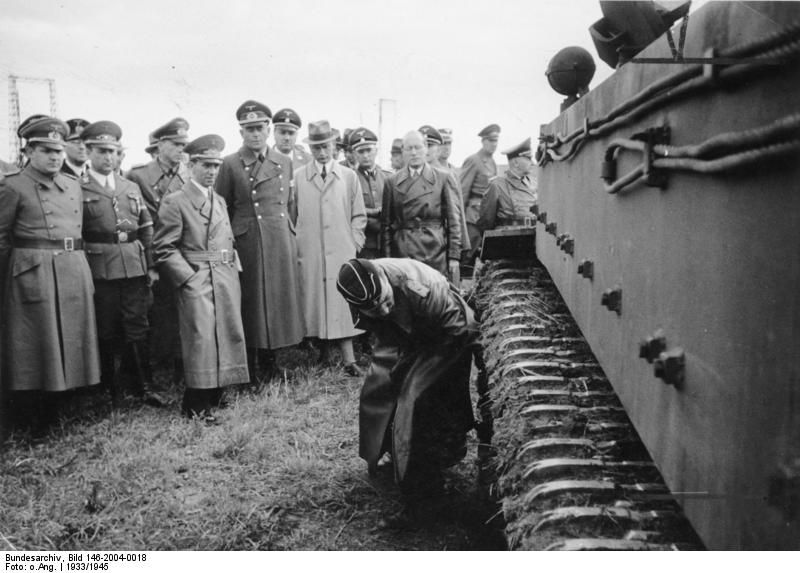 Goebbels and Speer during an inspection. Source: Bundesarchiv / Wikimedia Commons.
Goebbels and Speer during an inspection. Source: Bundesarchiv / Wikimedia Commons.The end
Alas, his luck was short lived. As the military messages of doom came in, even the eternal optimist and fighter lost his resilience. Goebbels increasingly sought Hitler’s company, who often withdrew to his bunker for longer periods of time. During the first months of 1945, all kinds of plans were made to transfer the Reichschancellory to Thüringen. Goebbels did not want any of this: he would never desert Berlin. He entertained various ideas as to how he would go down: after all, he was smart enough to see the war was lost. He talked about suicide, but also about blowing the Führerbunker or about an heroic death wih gun and swastika in hand. A glimmer of hope was lighted in Nazi hearts when the news of the death of President Franklin D. Roosevelt was received. Maybe this could influence the progress of military operations but soon, messages from the front shattered this hope.
In the last weeks of the war, Goebbels had his wife and children come to the Führerbunker in Berlin. On April 29th, 1945, Goebbels was witness to the wedding of Hitler and his mistress Eva Braun. The day after, Eva Braun took poison and Adolf Hitler shot himself throught the head. In his political testament Hitler rewarded Goebbels for his loyalty by naming him the new Reichskanzler. Goebbels refused to accept this function and decided to follow his beloved Führer to the grave.
His wife Magda had already consulted with SS physicians Ludwig Stumpfegger and Helmut Gustav Kunz various times as to how best the children - because they also should go down with them - could be killed. May 1st, 1945, they decided to join Hitler in death. Kunz injected the children with morphine but he refused to administer the deadly poison. Magda Goebbels therefore sent for Stumpfegger but she propably crushed the cyanidecapsules in the mouth of each of her children herself.
Shortly after, Goebbels and his wife left the bunker. In the garden, SS-Hauptsturmführer Günther Schwägermann was already waiting for them, pistol in hand. He shot both. Afterwards, as Goebbels had ordered, Schwägermann doused their bodies with petrol and set them afire. The charred remains were later found by Russian soldiers of Marshal Gheorghi Zhukov. They took some photographs and the remains were buried, along with those of their children in a mass grave, its location is unknown.
Definitielijst
- Führer
- German word for leader. During his reign of power Adolf Hitler was Führer of Nazi Germany.
- Marshal
- Highest military rank, Army commander.
- Nazi
- Abbreviation of a national socialist.
- swastika
- Equilateral cross, symbol of Nazi-Germany.
Information
- Article by:
- Gerd Van der Auwera
- Translated by:
- Arnold Palthe
- Published on:
- 19-01-2025
- Feedback?
- Send it!
- 03-'40: This Neutrality is a Queer Business
- 04-'40: Now It Can Be Told: Ark Royal & Graf Spee
- 10-'40: Polish Airmen Are Fighting in Britain's War
- 09-'43: From 'Fortress Europe' to 'Citadel Germany'
- 05-'45: My Visit to Wartime Holland
- 08-'45: Now It Can Be Told! - Goebbels Tried to Make Peace Terms
The War Illustrated
Related sights
Sources
- KNOPP, G., Hitlers beulen, de Prom, Baarn, 2001.
- SEMMLER, R., Goebbels, de man achter Hitler, Bigot & Van Rossum, Amsterdam, 1991.
- WYKES, A., Goebbels - Regisseur van het Derde Rijk, Standaard Uitgeverij, Antwerpen, 1991.
- Doob, L.W., Goebbels' Principles of Propaganda. In Public Opinion Quaterly, volume 14, Princeton
- Serendib.be
- Jewish Virtual Library
- Calvin College German Propaganda Archive
